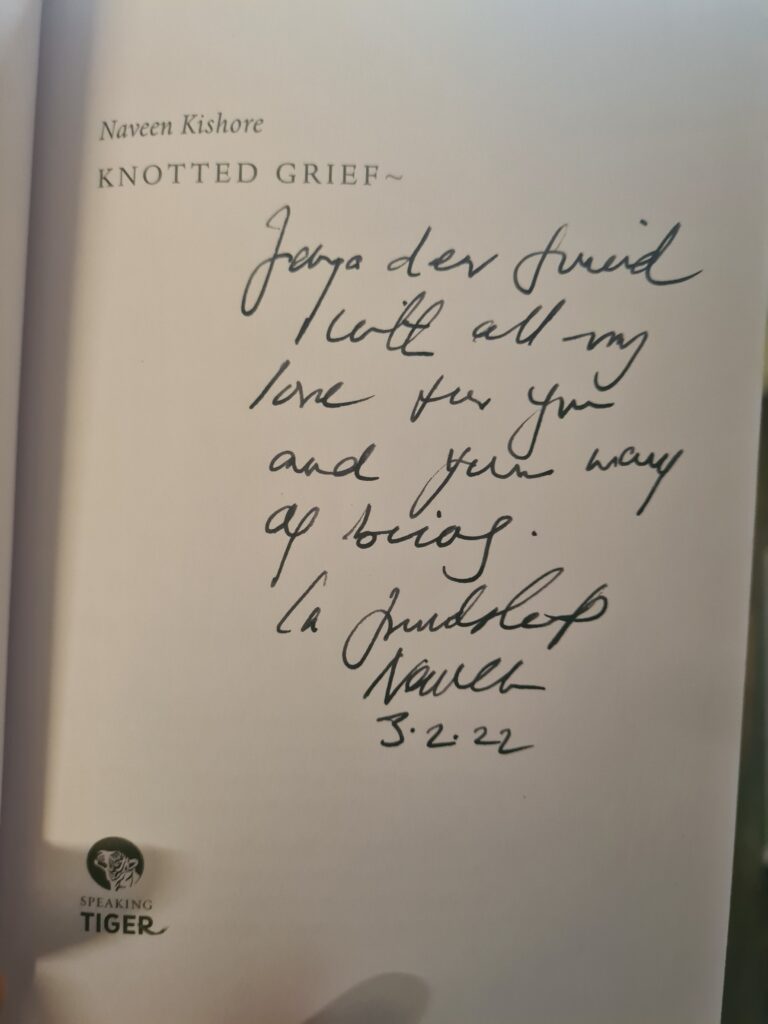“Knotted Grief” by Naveen Kishore

unannounced visitor
I dropped by into my dream
careful not to awaken the buried whispers
I lit a candle by their grave
startling the slumbering shadows into a frenzy of activity
bats taking wing flying blindly into one another
this in turn caused the whispers to awaken
look me in the eye
and begin to do what they did best
bear witness
Legendary publisher Naveen Kishore, founder, Seagull Books, has published his debut collection of poetry called Knotted Grief. It has been published by Speaking Tiger Books. He is the recipient of the Goethe Medal, a Chevalier de l’Ordre des Arts et des Lettres and was awarded the 2021 Ottaway Award for the Promotion of International Literature. Those who are fortunate to communicate with him directly and regularly, have been aware of his talents as a poet for a very long time. His emails are interspered with poetry or at times are only written in verse. The manner in which he responds to situations, events, moments, emotions are well described in his poems but also the way in which he arranges the words on the page. The visual element is as important as the content, ideas and emotions. For years, I have asked Naveen Kishore to get his poems published. I have always found the poems fantastic. It is a gift to be able to compose poems easily focussing upon the reader, so it always seem as if the poems are special. So I was delighted when the publication of Knotted Grief was announced by Speaking Tiger Books.

In Knotted Grief, the collection of poems are categorised according to “Coda”, “Kashmiriyat”, “Street Full of Widows”, “Selected Griefs”, “Tilted Sky”, “Under the Skin” and “Birdcall”. The poems are of varying lengths, from a cluster of words to verses scattered on the page. The sparse arrangement on the page ensures that the reader is absorbed by the few words on the page.
Upon reading the volume, I posed a few questions to Naveen Kishore. Here is the slightly edited version of the Q&A.
- How did this collection happen?
The collection happened by accident when my publisher friend Xavier Hennekinne of Gazebo ‘discovered’ that I write poetry by finding some of my poems in online poetry journals. he asked my if I had a book and I said no I have many folders with poems I have been writing for the last ten years! The reason fr not having a manuscript was simple enough. I was so busy writing I couldn’t stop, take stock, and put one together. This was solved by my friend and translator Tess Lewis who offered to select a first draft so that publishers could read it like a book! I went on to share this with Xavier at Gazebo and he in turn shared it with his poetry editor Phil Day, who is himself a poet and a painter. Phil then requested I send hi the four hundred odd poems I had set aside while selecting this collection and immersed himself in these for a few months and came up with Knotted Grief as you read it now!! Gazebo will publish on April 1st. The Speaking Tiger edition happened when I shared the Australian page set version except that Ravi selected more poems because he wanted an additional thirty pages. There is no collaboration between Seagull and Speaking Tiger! I offered my manuscript as any first time author to a publisher I admire. Seagull has nothing to do with it except do what we always do spread the word for friends in publishing! - Did you compose poetry specifically for this volume or did you select from previous compositions?
No. I have been writing on the human condition for many years. Kashmir is one theme but it could easily be Palestine. There is no recent or previous. You write every day. Like music. It is all a continuous riyaz. - Why did you focus upon grief? Is it one of the offshoots of the pandemic?
I didnt. Choose grief. It is usually the other way round. Grief does the choosing, if I may put it like that. You are visited upon by loss of friends close ones in an ever widening or lessening circle of affection. People close to you die. Go away. So you embrace their memory. Similarly at a political, national versus personal level their is grief that springs from what we as people do to each other. Again the ‘human condition’, ‘Kashmir’ ,’Palestine’ Interchangeable grieving. The poems and yes grieving is never without hope. - You have always written fabulous poetry. Why did you choose to publish your poetry now and not earlier?
I cannot as a publisher publish my own books! So one waited for someone to ‘discover’ my poems. Takes time! Besides to me the act of writing is more vital. - How many translations is this poetry being published in? Who are the publishers? Are you supervising the translations or are you letting the poems speak for themselves?
So far Rajkamal Prakashan Samuh very generously offered to do the Hindi; Ravi Dee Cee of DC books is doing the Malayalam; Papyrus is doing the Marathi; Unistar in the Punjabi; Chintan in Bengali; I am reaching out in Tamil, Kannada and Assamese too. Let see. Not really supervising but making myself available for translators should they wish to talk about things. Complete freedom to take liberties as long as the essence of the ‘target’ language is hospitable to what I may be attempting in English. So yes the poems have to touch the translators. - As far as I know, the arrangement of the words on the page are as critically important as the poem itself. How will you manage this quality control in the translated texts especially if you are unfamiliar with the destination language?
I am flexible. It will boil down to the combination of the translator and editor in the language edition to do the best they feel they can to convey render share the original thought in their own languages. This means they have the freedom to lay out the poems the way they wish. - You are a publisher known for publishing extensive translations. Are there any guidelines/sensibilities that you have honed as a publisher over the years that you would ensure are followed in translating your poetry as well?
None. I leave it to the publisher, editor, and translators who become the first sensitive readers in that language. Having said that I may be able to help fine hone the languages I know, Punjabi, Hindi, Bengali. - Would you change the collections ever so slightly in every language or will the same edition be made available in all editions?
I think mostly the Indian edition is being followed. I would more or less treat that as the one I would want translated. But open to the variant should it happen organically or for reasons that are yet to come up.
I truly liked Knotted Grief. Perhaps you will too. Buy it. Read it.
8 Feb 2022

No Comments